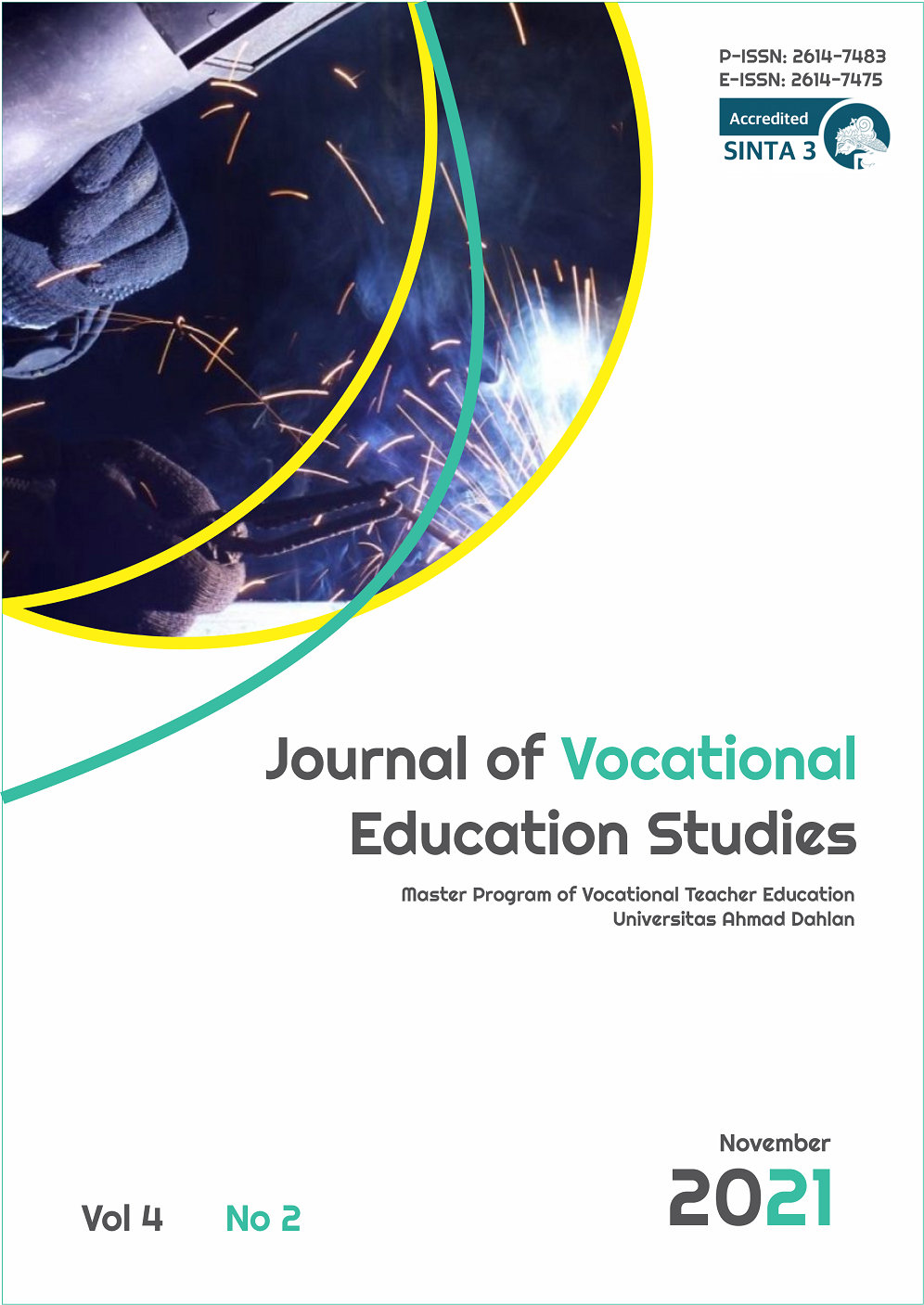Developtment Virtual Laboratory of Digital Electronics Using Mobile Virtual Reality
DOI:
https://doi.org/10.12928/joves.v4i2.5742Abstract
The virtual laboratory of digital electronics using mobile virtual reality technology to save to cost of making real laboratory. Mobile virtual reality can use by student to practice digital electronics skill in their home. This study to finds the skill improvement of student in competency digital electronics using virtual laboratory with mobile virtual reality based. Virtual laboratory can help student to feel the real practice of laboratory in everywhere and every time. The feature of virtual laboratory is: (1) enable to do practice digital electronics in every time and everywhere, (2) student can do experiment like in laboratory using android phone, (3) support with many of android phone series. This study uses a research and development method using waterfall model that have five stage to develop a software application. The results show that the virtual laboratory can help student to improve their skill of digital electronics because easy feature and real time of virtual laboratory
References
Almarshoud, A, F. (2011). The advancement in using remote laboratories in electrical engineering education: a review. European Journal of Engineering Education, Vol. 35(5). 425-433.J. Clerk Maxwell, A Treatise on Electricity and Magnetism, 3rd ed., vol. 2. Oxford: Clarendon, 1892, pp.68-73.
Mekonnen E. (2004). Health Laboratory Management and Quality Assurance. Ethiopia: Gondar University College.K. Elissa, “Title of paper if known,” unpublished.
WHO. (2011). Laboratory Quality Management System. France: WHO
Education Bureau. (2013). Safety in Science Laboratories.
Persson, V. & Nouri, J. (2018) A Systematic Review of Second Language Learning with Mobile Technologies. International Journal of Emerging Technologies in Learning. Vol. 13 (2), 53-61.
Zhang, M., Zhang, Z., Chang, Y., Aziz, E., & Chassapis, C. (2018). Recent Developments in Game-Based Virtual Reality Educational Laboratories Using the Microsoft Kinect. International Journal of Emerging Technologies in Learning. Vol. 13(1), 138-159.
Odeh, S., Shanab, S, A., & Anabtawi, M. (2015). Augmented Reality Internet Labs versus its Traditional and Virtual Equivalence. International Journal of Emerging Technologies in Learning. Vol. 10 (Issue 3), 4-9.
Lixia, Z. & Guangran, L. (2009). Study and Design of 3D Virtual Scenes of Virtual Laboratory. International Conference on Computational Intelligence and Security, 11-14 December 2009, Beijing, China.
Jaya, H. (2010). Laboratorium Virtual Mata Kuliah Praktikum Elektronika Digital: Jurusan Pendidikan Teknik Elektronika Fakultas Teknik Universitas Negeri Makassar. Jurnal Elektronika Telekomunikasi & Computer, Vol.4(2). 699-710.
Dyrberg, N, R., Treusch, A, H., & Wiegand, C. (2016). Virtual laboratories in science education: Students Motivation and Experiences in Two Tertiary Biology Courses. Journal of Biological Education. Vol.51 (4), 358-374.
Ogungbenro, O, U., Chukwudebe, G, A., Opara, F, K., & Ezeh, G, N. (2017). Design and Implementation of Logic Gate Emulator. 3rd International Conference on Electro-Technology for National Development, 7-10 November 2017, Owerri, Nigeria
Hargiyarto, P. (2011). Analisis Kondisi dan Pengendalian Bahaya di Bengkel/Laboratorium Sekolah Menengah Kejuruan. Jurnal Pendidikan Teknologi dan Kejuruan, Vol.20(2). 203-210.
Ismail, M. E., Harun, H., Abdul Razzaq, A.R., Irwan Mahazir, I., Abd Samad, N., Othman, H. (2018). Perceptions, knowledge, a. Jurnal Pendidikan Teknologi dan Kejuruan, Vol.20(2). 203-210.nd attitude s of students towards safety practice in culinary laboratories.
Downloads
Published
Issue
Section
License
Copyright (c) 2022 Universitas Ahmad Dahlan

This work is licensed under a Creative Commons Attribution-ShareAlike 4.0 International License.
Authors who publish with Journal of Vocational Education Studies (JOVES) agree to the following terms: Authors retain the copyright and grant the Universitas Ahmad Dahlan right of first publication with the work simultaneously licensed under a Creative Commons Attribution License (CC BY-SA 4.0) that allows others to share (copy and redistribute the material in any medium or format) and adapt (remix, transform, and build upon the material) the work for any purpose, even commercially with an acknowledgement of the work's authorship and initial publication in Universitas Ahmad Dahlan. Authors are able to enter into separate, additional contractual arrangements for the non-exclusive distribution of the journal's published version of the work (e.g., post it to an institutional repository or publish it in a book), with an acknowledgement of its initial publication in Universitas Ahmad Dahlan. Authors are permitted and encouraged to post their work online (e.g., in institutional repositories or on their website) prior to and during the submission process, as it can lead to productive exchanges, as well as earlier and greater citation of published work (See The Effect of Open Access).










.png)



